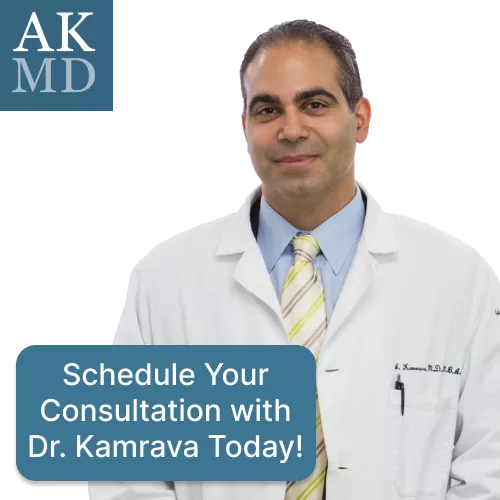When you first suspect you’re suffering from hemorrhoids, over-the-counter or home remedies may be the first types of treatments you seek. While those options may be appropriate for a short period of time, the frequent occurrence of hemorrhoids can interfere with your daily activities and evoke concerns about your health.
Chronic hemorrhoid treatment often requires a specialized level of care. Dr. Kamrava will help alleviate the mystery of your hemorrhoids as he addresses your questions and prescribes a treatment that will restore your quality of life.
What Are Hemorrhoids?
Hemorrhoids are normally occurring veins located at junction of the rectum or anus. With time, they can become swollen and enlarged and can cause a number of physical symptoms, including pain, itching, throbbing, and bleeding. There are two types of hemorrhoids, internal and external, and treatment varies depending on a patient’s specific condition.
 What Causes Hemorrhoids?
What Causes Hemorrhoids?
A variety of circumstances can trigger hemorrhoids in individuals. The exact cause will vary from person to person, but some common instances include a strained bowel movement, frequent sitting for an extended period of time, constipation, other anal infections, and diseases that affect the liver.
Types of Hemorrhoids
- Internal hemorrhoids are located inside the lining of the rectum. Since they occur inside the body, people with internal hemorrhoids may not immediately attribute their abnormalities to the presence of one or more hemorrhoids. This type of hemorrhoid is not always associated with pain, but there may be blood present during a bowel movement, as well as throbbing or itching.
- External hemorrhoids are easier to diagnose because they are visible bumps on the outside of the anus. The bumps are a result of swollen veins filled with blood, and they may cause the exterior part of the anus to become raw or itchy.
Diagnosis and Treatment
Simple procedures help diagnosis the type and level of severity of your hemorrhoids. A digital rectal exam inspects the anal canal for any abnormalities. If you suspect that you have internal hemorrhoids, an anoscope may be utilized to view the inside of the anus and rectum.
Hemorrhoid banding is a treatment for internal hemorrhoids that does not require surgery. Minimally invasive hemorrhoid treatment is a painless procedure that cuts off blood supply to the hemorrhoid, causing it to fall off within a few days and pass during a bowel movement. Sclerotherapy is another quick and safe procedure that helps you get relief from hemorrhoids.
Surgery is another option if you have persistent hemorrhoids that don’t respond well to other treatments. Depending on your condition, there are a number of surgeries, such as hemorrhoidectomy, that pinpoint the location of hemorrhoids and remove the excess tissue that causes discomfort and bleeding. Dr. Kamrava will recommend the most appropriate procedure for you.
Hemorrhoid Treatment Frequently Asked Questions
Since there are two types of hemorrhoids and the severity of hemorrhoids varies, it’s common to have many questions about the best of type of hemorrhoid treatment for your specific case. Here are frequently asked questions about hemorrhoids to help guide you in the right direction. Please feel free to contact our office at 424.279.8222 if you have additional questions or would like to schedule a consultation.
Q: Can I use over-the-counter medication for my hemorrhoids?
A: Over-the-counter medication may relieve the pain and itching associated with mild external hemorrhoids, but internal hemorrhoids and persistent external hemorrhoids may require more comprehensive treatment. These ointments often have steroids and extended use may actually worsen the symptoms. You’ll want a solution that will clear up your chronic hemorrhoid problem rather than just address symptoms.
Q: When should you see a doctor for hemorrhoids?
A: If your hemorrhoids don’t clear up within a week, you may need professional assistance. Rectal bleeding and pain indicate more severe cases that should be examined by a doctor as soon as possible.
Q: How are hemorrhoids diagnosed?
A: External hemorrhoids can be diagnosed by a visual and rectal examination. To determine the presence of internal hemorrhoids, an anoscope may be utilized.
Q: Will I need surgery for my hemorrhoids?
A: Hemorrhoid banding and sclerotherapy are common non-surgical methods for treating hemorrhoids, but surgery, such as a hemorrhoidectomy, may be required in certain cases. Once your individual case is assessed, the best hemorrhoid treatment for you will be determined.
Q: What are the treatments for hemorrhoids?
A: It really depends. Hemorrhoids are a symptomatic problem — that is to say, that unless a procedure is tailored around the symptoms that are ailing you, the procedure will not be successful. Because of this, it is all but impossible to recommend a one size fits all approach for hemorrhoids. The different approaches that Dr. Kamrava utilizes for the treatment of hemorrhoids include – hemorrhoidal sclerotherapy, hemorrhoidal banding, excisional hemorrhoidectomies, Milligan-Morgan Hemorrhoidectomies, T.H.D. for Hemorrhoids and the newest and most minimally invasive technique, Laser Hemorrhoidoplasty.
Q: Is hemorrhoid treatment painful?
A: Hemorrhoid banding and sclerotherapy are not painful, and during a hemorrhoidectomy you’ll receive anesthesia. A hemorrhoidectomy can be performed as an outpatient procedure; however, there will be some pain and discomfort associated with the more extensive treatment.
Call Today to Schedule a Hemorrhoid Treatment Consultation With Dr. Kamrava
To learn more about your hemorrhoid treatment options, contact Dr. Kamrava in Los Angeles. He is a board-certified colorectal specialist who will help determine the best way to get relief from hemorrhoids. Schedule a consultation today by calling 424.279.8222!
Next, learn about pilonidal disease.




